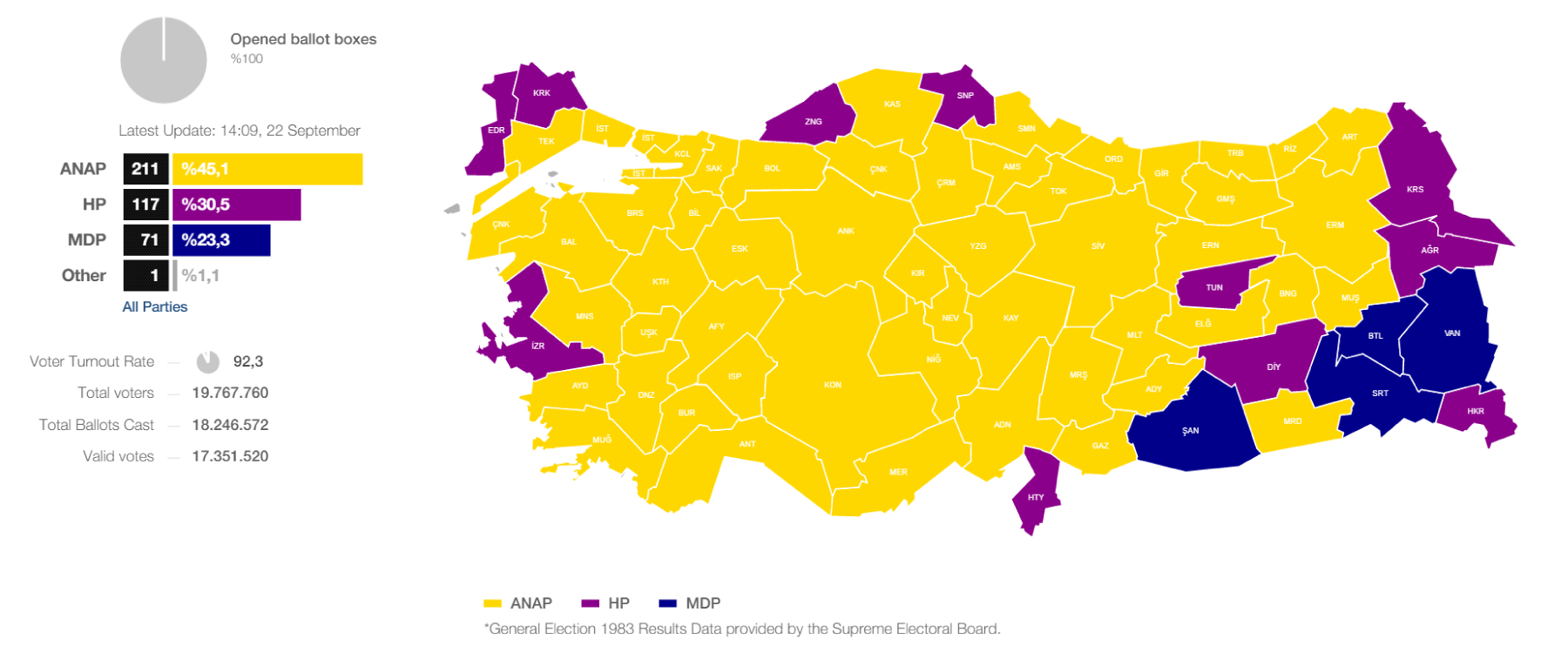2024 Local Election




Turkish people went to the polling stations to elect new members of the 550-seat Parliament on June 7. No political party was able to gain a strong majority enough to form a single-party government in the country’s 25th Parliament. A political party must secure at least 276 seats, in other words, two-thirds majority in Parliament, to come to power alone under the Turkish laws. Turkey’s Supreme Election Board (YSK) announced the final results of the elections on June 18. The ruling Justice and Development Party, (AK Party) won 41 percent, securing 258 seats, only 18 seats short of a strong majority in Parliament. The main opposition Republican People’s Party (CHP) became the second largest party in the polls, but fared worse than the 2011 elections, winning 132 seats with 25 percent of votes. The Nationalist Movement Party (MHP) saw its share of the vote increase to 16.30 percent, securing 80 seats in Parliament. In the 2011 elections, the hardline party has gained nearly 13 percent of the votes with 53 seats. The biggest surprise in the 2015 general elections was the pro-Kurdish Peoples’ Democratic Party’s (HDP) decision to run as a party rather than fielding independent candidates as in previous years. The HDP secured 13.2 percent at the polls and won 80 seats in Parliament, gaining support from its traditional roots and non-Kurdish voters, despite concerns that it may have fallen below the 10 percent national threshold and lost parliamentary representation. The YSK said none of the independent parliamentary candidates managed to enter Parliament in the elections which the voter turnout rate was 83.92 percent. The AK Party lost its 13-year majority rule in government after serving three terms consecutively since the 2002 election in which it came to power for the first time. A snap election was called after efforts to form a coalition government failed. It is the first time in Turkey’s political history that an early election is called as the largest party in the Parliament failed to find a junior partner for coalition. President Recep Tayyip Erdoğan has officially called for snap elections after interim Prime Minister Ahmet Davutoğlu was unable to find a coalition partner in talks with the nationalist MHP and the secularist CHP, during the 45-day period for designating a coalition government which ended on Aug. 23. Using his constitutional powers, the president charged Davutoğlu to form a caretaker government to take the country to early elections. A Turkish prime minister must form the caretaker government within five days, according to Article 114 of the Constitution. Considering that all possibilities have been exhausted before the Aug. 23 deadline, the YSK announced that Turkey will hold early elections on Nov. 1 after the president called for a new vote, citing his authority enacted under the 116th article of the Turkish Constitution. Article 116 says that in the event a new cabinet cannot be formed within 45 days or the new Cabinet fails to receive a vote of confidence, the president of the Republic, in consultation with the president of the Turkish Grand National Assembly, may call for new elections.




Turkish people went to the polling stations to elect new members of the 550-seat Parliament on June 7. No political party was able to gain a strong majority enough to form a single-party government in the country’s 25th Parliament. A political party must secure at least 276 seats, in other words, two-thirds majority in Parliament, to come to power alone under the Turkish laws. Turkey’s Supreme Election Board (YSK) announced the final results of the elections on June 18. The ruling Justice and Development Party, (AK Party) won 41 percent, securing 258 seats, only 18 seats short of a strong majority in Parliament. The main opposition Republican People’s Party (CHP) became the second largest party in the polls, but fared worse than the 2011 elections, winning 132 seats with 25 percent of votes. The Nationalist Movement Party (MHP) saw its share of the vote increase to 16.30 percent, securing 80 seats in Parliament. In the 2011 elections, the hardline party has gained nearly 13 percent of the votes with 53 seats. The biggest surprise in the 2015 general elections was the pro-Kurdish Peoples’ Democratic Party’s (HDP) decision to run as a party rather than fielding independent candidates as in previous years. The HDP secured 13.2 percent at the polls and won 80 seats in Parliament, gaining support from its traditional roots and non-Kurdish voters, despite concerns that it may have fallen below the 10 percent national threshold and lost parliamentary representation. The YSK said none of the independent parliamentary candidates managed to enter Parliament in the elections which the voter turnout rate was 83.92 percent. The AK Party lost its 13-year majority rule in government after serving three terms consecutively since the 2002 election in which it came to power for the first time. A snap election was called after efforts to form a coalition government failed. It is the first time in Turkey’s political history that an early election is called as the largest party in the Parliament failed to find a junior partner for coalition. President Recep Tayyip Erdoğan has officially called for snap elections after interim Prime Minister Ahmet Davutoğlu was unable to find a coalition partner in talks with the nationalist MHP and the secularist CHP, during the 45-day period for designating a coalition government which ended on Aug. 23. Using his constitutional powers, the president charged Davutoğlu to form a caretaker government to take the country to early elections. A Turkish prime minister must form the caretaker government within five days, according to Article 114 of the Constitution. Considering that all possibilities have been exhausted before the Aug. 23 deadline, the YSK announced that Turkey will hold early elections on Nov. 1 after the president called for a new vote, citing his authority enacted under the 116th article of the Turkish Constitution. Article 116 says that in the event a new cabinet cannot be formed within 45 days or the new Cabinet fails to receive a vote of confidence, the president of the Republic, in consultation with the president of the Turkish Grand National Assembly, may call for new elections.


Turkish people went to the polling stations to elect new members of the 550-seat Parliament on June 7. No political party was able to gain a strong majority enough to form a single-party government in the country’s 25th Parliament. A political party must secure at least 276 seats, in other words, two-thirds majority in Parliament, to come to power alone under the Turkish laws. Turkey’s Supreme Election Board (YSK) announced the final results of the elections on June 18. The ruling Justice and Development Party, (AK Party) won 41 percent, securing 258 seats, only 18 seats short of a strong majority in Parliament. The main opposition Republican People’s Party (CHP) became the second largest party in the polls, but fared worse than the 2011 elections, winning 132 seats with 25 percent of votes. The Nationalist Movement Party (MHP) saw its share of the vote increase to 16.30 percent, securing 80 seats in Parliament. In the 2011 elections, the hardline party has gained nearly 13 percent of the votes with 53 seats. The biggest surprise in the 2015 general elections was the pro-Kurdish Peoples’ Democratic Party’s (HDP) decision to run as a party rather than fielding independent candidates as in previous years. The HDP secured 13.2 percent at the polls and won 80 seats in Parliament, gaining support from its traditional roots and non-Kurdish voters, despite concerns that it may have fallen below the 10 percent national threshold and lost parliamentary representation. The YSK said none of the independent parliamentary candidates managed to enter Parliament in the elections which the voter turnout rate was 83.92 percent. The AK Party lost its 13-year majority rule in government after serving three terms consecutively since the 2002 election in which it came to power for the first time. A snap election was called after efforts to form a coalition government failed. It is the first time in Turkey’s political history that an early election is called as the largest party in the Parliament failed to find a junior partner for coalition. President Recep Tayyip Erdoğan has officially called for snap elections after interim Prime Minister Ahmet Davutoğlu was unable to find a coalition partner in talks with the nationalist MHP and the secularist CHP, during the 45-day period for designating a coalition government which ended on Aug. 23. Using his constitutional powers, the president charged Davutoğlu to form a caretaker government to take the country to early elections. A Turkish prime minister must form the caretaker government within five days, according to Article 114 of the Constitution. Considering that all possibilities have been exhausted before the Aug. 23 deadline, the YSK announced that Turkey will hold early elections on Nov. 1 after the president called for a new vote, citing his authority enacted under the 116th article of the Turkish Constitution. Article 116 says that in the event a new cabinet cannot be formed within 45 days or the new Cabinet fails to receive a vote of confidence, the president of the Republic, in consultation with the president of the Turkish Grand National Assembly, may call for new elections.
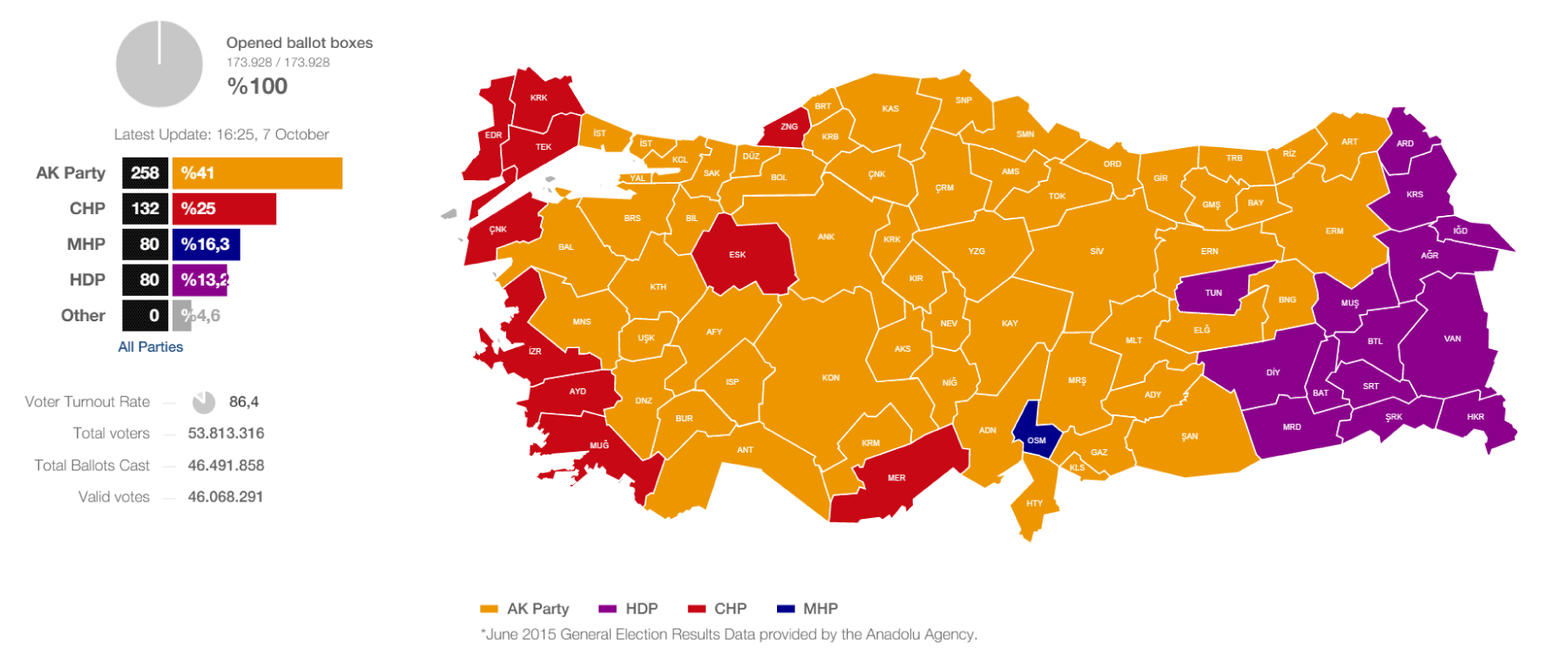

On June 12, 2011, Turkey held its general election at the scheduled time for the first time in 34 years. The Turkish Grand National Assembly, on March 3, 2011, unanimously approved a resolution about holding the parliamentary election on June 12. The use of Kurdish language in election propaganda was permitted with some reforms in the election law in April 2010. Heat-resistant, rigid plastic, transparent ballot boxes were used instead of wooden boxes.
The campaign duration was extended from 20 days to 30 notifying via billboards. Citizens aged 25 were given the chance to run as deputy candidates for the first time. According to a decision by Turkey's Supreme Election Board (YSK) released on March 5, 2011, 27 political parties in total were allowed to participate in the elections. On March 2, 2011, the YSK published the number of deputies in each electoral unit, based on the 2010 census.
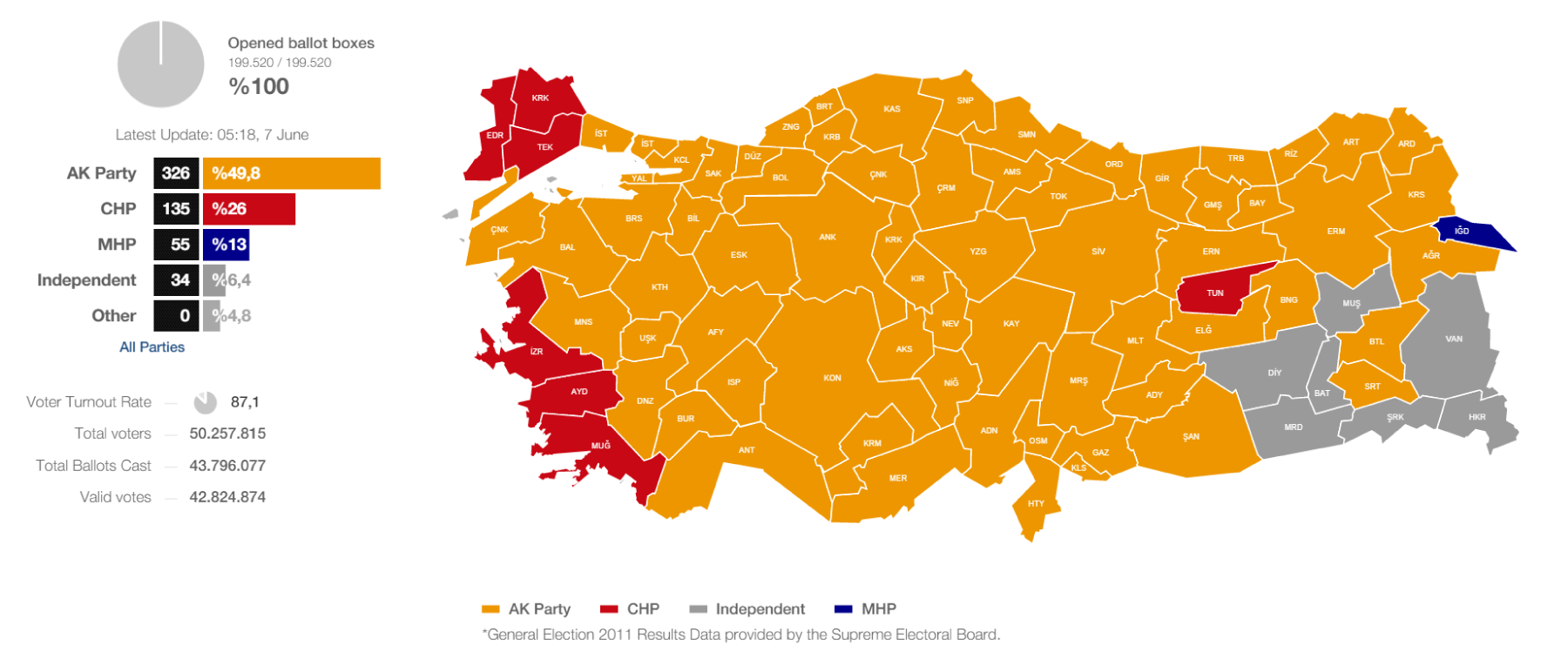


The general election held on July 27, 2007 took place with the participation of 14 political parties and 699 independent candidates to determine the members of the 23rd legislative period of the Grand National Assembly of Turkey (TBMM). Since the 11th president could not be elected, the nation went to the ballot box as a requirement of the 101st article of the Constitution of the Republic of Turkey. There were 14 political parties and 699 independent candidates in the election. The electorate vote rate was 84.24 percent. A 10 percent threshold was applied as a requirement of article 33 of the Parliamentary Election Law. The parties eligible to enter the elections and the number of deputies per city were announced by the YSK on May 4, 2007.
The AK Party, chaired by Recep Tayyip Erdoğan garnered 46.66 percent of the votes, while the Republican People’s Party (CHP) chaired by Deniz Baykal received 20.85 percent of the votes and the Nationalist Movement Party (MHP) chaired by Devlet Bahçeli received 14.27 percent. While the AK Party’s number of seats in Parliament dropped from 363 to 341 and the CHP’s dropped from 178 to 112, the MHP made it back into Parliament with 71 seats.
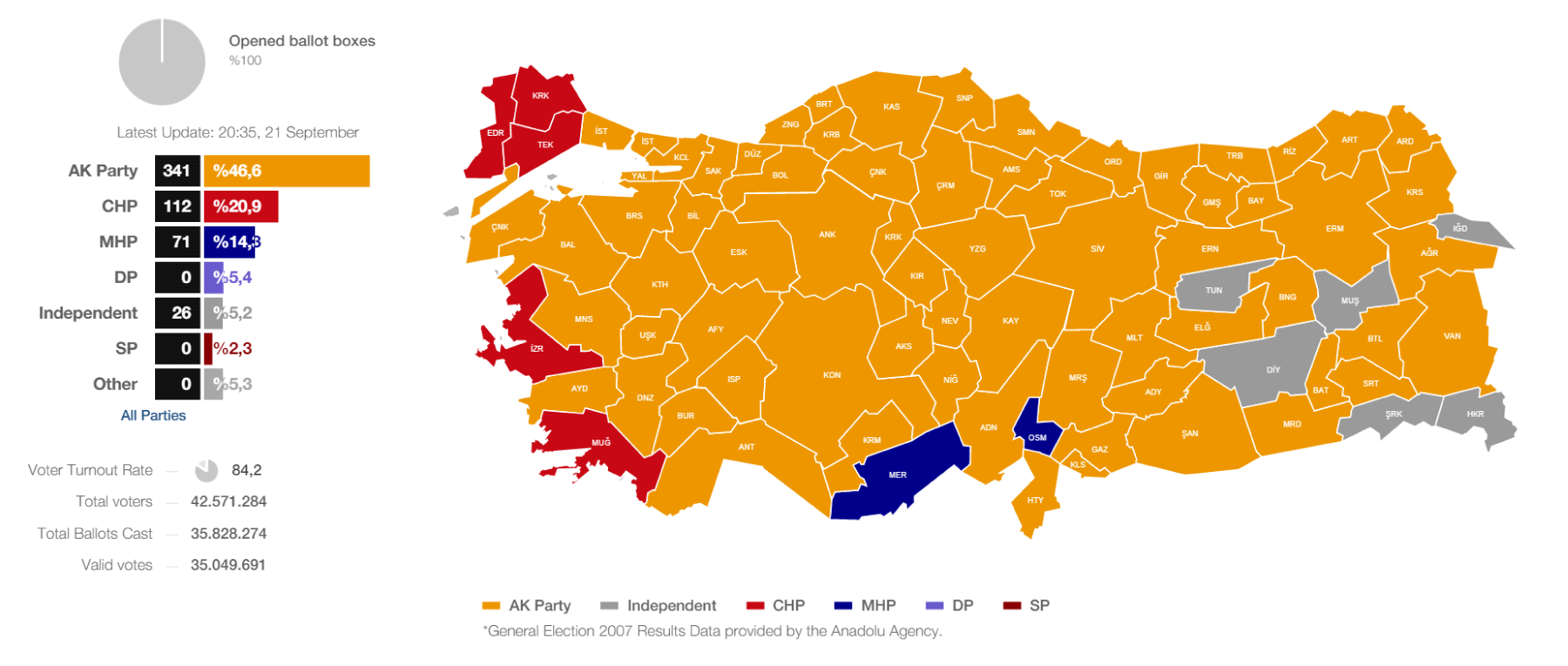
The deputies of the 22nd legislative period of the TBMM were elected on Nov. 3, 2002. The AK Party, which won 363 seats in the 2002 general election with 34.3 percent of the votes, was the political party to gain the biggest representation in the TBMM after the 1950s. The DSP, MHP and ANAP, which were formed after the 1999 general elections and governed the country as part of the coalition government until the 2002 elections, and opposition DYP, SP and YTP were unable to pass the threshold. Since AK Party Chairman Recep Tayyip Erdoğan couldn’t become a deputy, AK Party Vice Chairman Abdullah Gül was charged by then-President Necdet Sezer on Nov. 16, 2002, to form the government. On Dec. 2, 2002, the YSK cancelled the election results in Siirt, and upon a decision to repeat election in this election district, as a result of the elections repeated on March 9, 2003 with the participation of four parties alone, the AK Party won all three of them. Hence, the AK Party’s number of seats in Parliament rose to 365, while the CHP’s dropped to 177 and independents’ to eight. In the same elections Erdoğan was elected deputy from Siirt. With the resignation of Abdullah Gül from the prime ministry, the government was formed by Erdoğan.
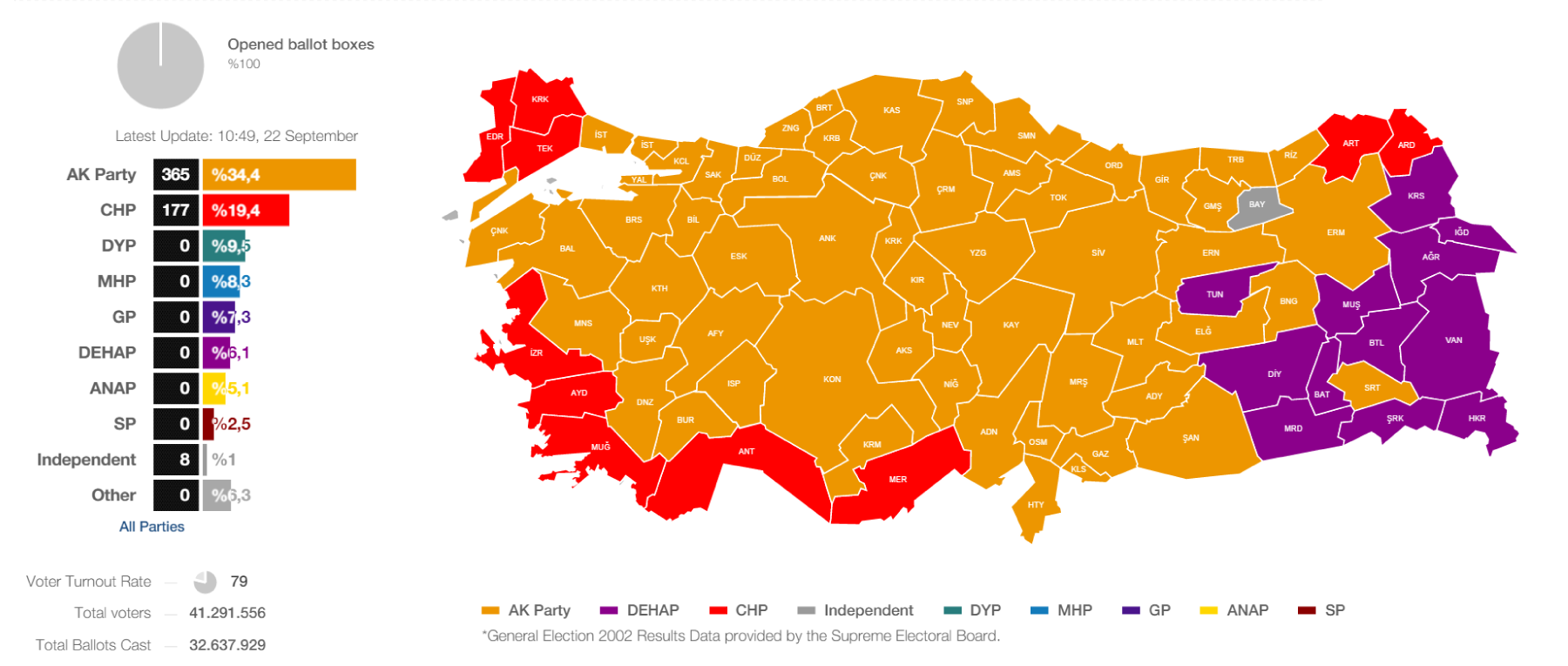
With the 10 percent threshold rule applied, 550 deputies made it into Parliament in 84 election districts in 80 provinces of Turkey. The TBMM General Assembly held on July 30, 1998, decided to hold an early general election and local election together on April 18, 1999. This was the second time the local and general elections were held together. The April 18, 1999 general election that saw 20 parties participate was the first among the free elections held after the 1950s with the highest number of political parties. In the first elections in its history that the CHP couldn’t make it into the TBMM, the DSP increased its votes approximately 50 percent and won the elections. The MHP, which remained below the 10 percent threshold in the previous elections, failing to enter Parliament, increased its votes about 100 percent and became the second party in Parliament. The number of female deputies in Parliament increased from 13 in 1995 to 23. Following the elections, the 9th President Süleymen Demirel tasked DSP Chairman Bülent Ecevit with forming the government. Bülent Ecevit formed the 17th coalition government comprised of the DSP, MHP, and ANAP on May 28, 1999.
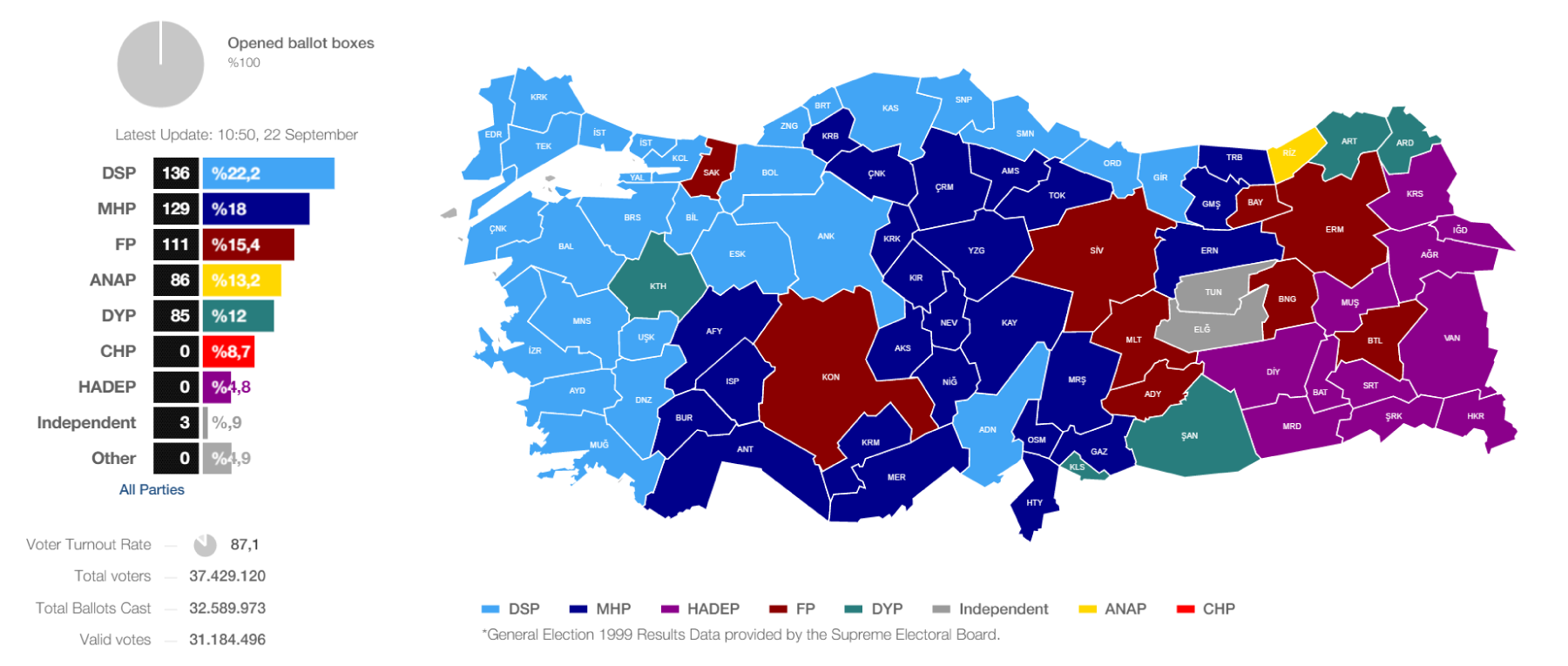
The general elections held on Dec. 24, 1995, took place with the participation of 12 political parties to determine the members of the 20th legislative period of the TBMM. The motion accepted at the TBMM General Assembly on Oct. 27, 1995, set the date for the general elections as Dec. 24. With an amendment to the law ahead of the elections, the eligible age to vote was reduced from 20 to 18. Those in the 18-20 age groups voted for the first time in these elections and those in prison were also given the right to vote.With the same amendment, the number of TBMM members was increased from 450 to 550. One-hundred of these 550 deputies were proposed to be elected as “Turkey deputies,” based on the votes the parties receive across the country, without limitation to their electorate districts. While the 10 percent country threshold was maintained, the electorate district thresholds were dropped to 10 percent. Upon the application of the DSP, the Constitutional Court cancelled the regulations proposing the precinct threshold and the election of 100 new deputies under the name "Turkey Deputy". The elections were held with the TBMM member number upped to 550.
Seven deputy candidates from the Grand Unity Party (BBP) took part in the elections, which saw 12 political parties compete, from ANAP, the Revolutionary Power Party (SİP) and HADEP lists. The VP won the elections with 21.4 percent of the votes, securing 158 seats in Parliament. When VP Chairman Necmettin Erbakan’s coalition attempt with ANAP failed, approximately two months after the elections, the ANAP-DYP coalition was formed. With the Constitutional Court’s cancellation of the confidence vote, the ANAYOL coalition ended. The Refahyol government formed by the RP and DYP on June 28, 1996, under Erbakan’s leadership, got the vote of confidence on July 8.
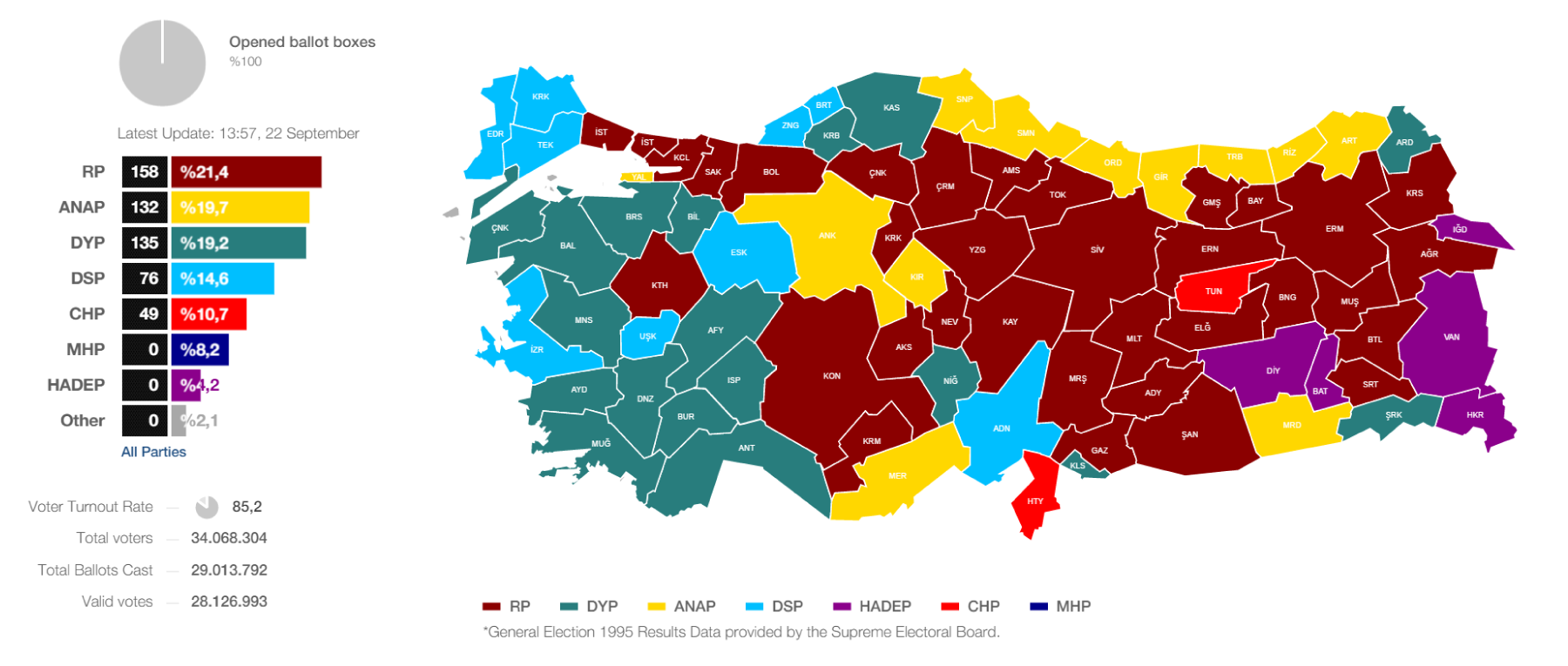
The general elections, held on Oct. 20, 1991, took place with the participation of six political parties and independent candidates to determine the members of the 19th legislative period of the TBMM. Parliament speaker Yıldırım Akbulut was appointed to the position of prime minister, which was vacated with the election of Turgut Özal as president. Akbulut was later elected chairman of ANAP. Mesut Yılmaz, who was elected as chairman of the party at ANAP’s general congress on June 15-16, 1991, was appointed prime minister – since ANAP was the party in power - upon Akbulut’s resignation. The new ANAP administration decided to hold the general elections scheduled for November 1992 at an earlier date.
ANAP came second in the Oct. 20, 1991 elections in which six political parties and independent candidates competed, losing the position of power after eight years. After the elections, with the separation of the parties that entered the elections with an alliance, there were eight political parties in Parliament. These elections saw pre-Sept. 12 coup leader Bülent Ecevit, Erbakan and MHP founder Alparslan Türkeş return to Parliament after an 11-year interval. In addition to the leaders, 32 deputies, 21 from the Justice Party (AP), seven from the CHP, three from the National Salvation Party (MSP) and one from the MHP, were re-elected for Parliament in these elections. Since no political party had the majority to form a government, forming a coalition government had become mandatory. Süleyman Demirel formed a coalition government with the SHP, which had 88 members in Parliament. SHP Chairman Erdal İnönü became deputy prime minister.
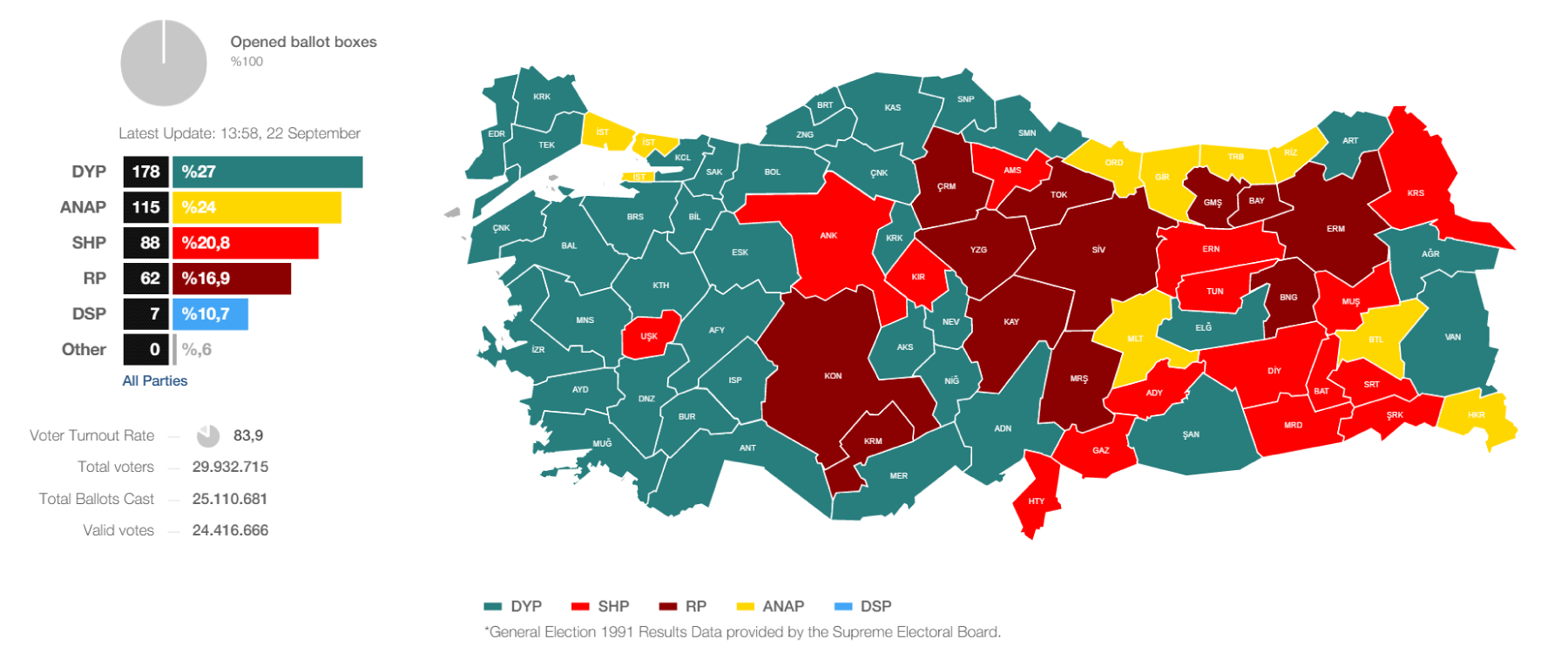

1987 was the year of the ballot box. First, about 100 new minor municipality administrators were elected, followed by a referendum that saw early general elections take place on Nov. 29. The Sept. 6, 1987 referendum was held to lift the bans that were imposed on party leaders within the scope of the Sept. 12 Constitution. The referendum ended with 50.24 percent “yes” votes and 49.77 “no” votes.
Electoral districts were downsized as per the new election law put into effect in the early 1987 general elections. The party that received one vote more than the other parties was given additional deputyships. The regional threshold increased with the downsizing of the electoral district. ANAP, which garnered 36 percent of total votes, secured 292 seats in Parliament, gaining a majority of about 65 percent.
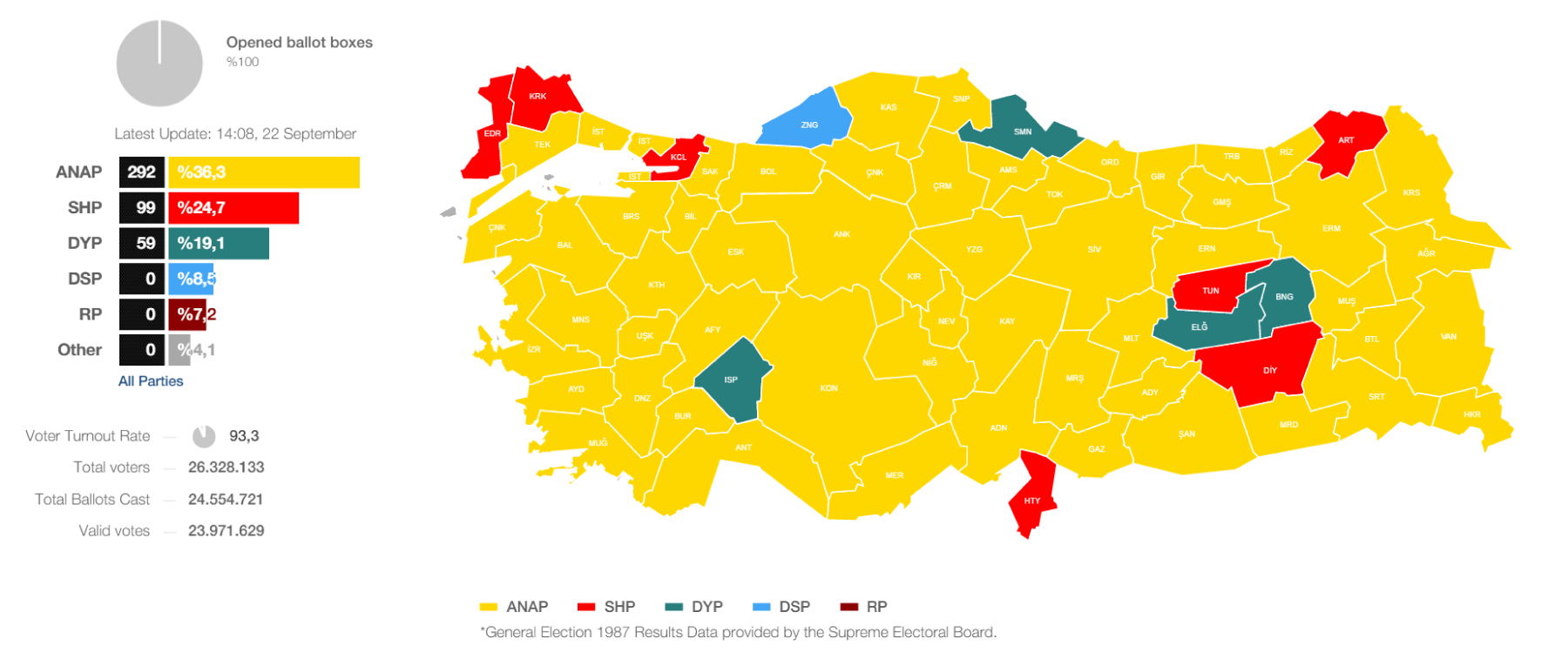

The TBMM’s 17th legislative period deputies were elected with the 1983 Turkey general election, the first general election held after the Sept. 12 coup. The 10 percent election threshold was introduced with the Deputy Election Law number 2839, which was accepted on June 10, 1983. With the 1983 elections, based on the number of deputies per province, electoral districts were formed for the first time. ANAP, formed under the leadership of Turgut Özal, came to power alone in the election held with the three parties permitted by the National Security Council (MGK), winning 211 seats in the 400-seat Parliament.
While 12 female deputies made it into Parliament, none of the 50 independent candidates, who participated from 42 electoral districts, were able to receive the number of votes necessary to enter Parliament. On Nov. 20, Turgut Özal was charged by President Kenan Evren to form the government. The MGK’s duty ended with the establishment of the Presidential Council at the TBMM, which assembled on Nov. 24, 1983. On Dec. 13, Özal formed the ANAP government.
